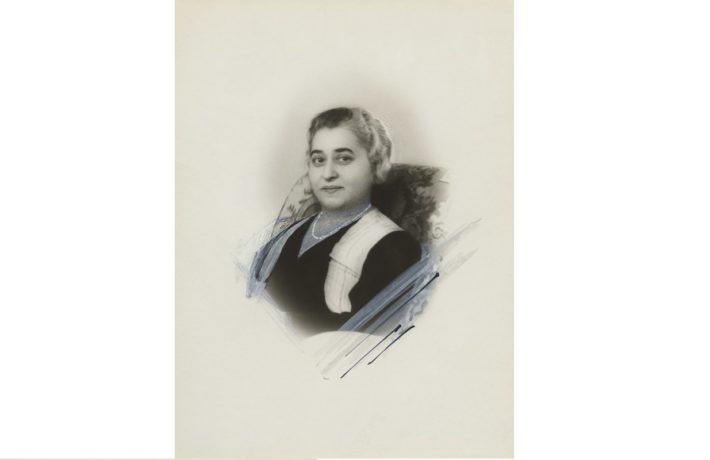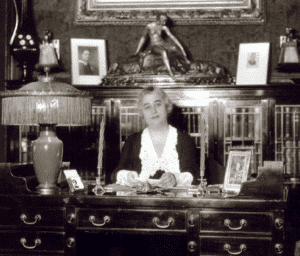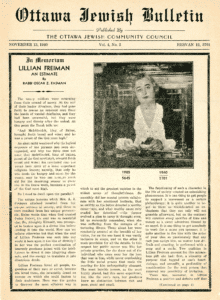
June 6, 1885 – November 2, 1940
Unquestionably the most prominent Jewish woman in Canada during the interwar period, Lillian Freiman not only forwarded Jewish causes, she forged ties with all Canadians through community service. In 1935, she was awarded the Order of the British Empire (OBE). This was the first OBE conferred upon a Jewish Canadian.

Freiman was born in Mattawa, Ont., the fifth of 11 children to Pauline Reiche and Moses Bilsky—Ottawa’s first Jewish settler who became the city’s pre-eminent Jewish citizen. Charitable work was a part of everyday life for the Bilskys, and this ideology paved a path for Freiman toward volunteerism. Though not yet 30 at the outbreak of the First World War, Freiman established herself as a civic leader in Ottawa and worked for the Great War Veterans Association, the forerunner of the Royal Canadian Legion. Inspired by annual poppy campaigns in the United States and France, she adopted the fundraiser in Ottawa in 1921 and chaired the Legion Poppy Campaign until 1940. For her efforts, she was awarded honorary life membership to the legion, becoming the first woman to be honoured in this way.
Freiman also aided the war effort through work with the Red Cross. A Red Cross sewing circle, which she began in her home, evolved into the Disraeli Chapter of the Daughters of the Empire (IODE). At the same time, she volunteered with the Ottawa Juvenile Court, served as treasurer of the Ottawa Welfare Bureau, president of the Ottawa Girl Guide Association, the Ottawa Day Nursery, the Perley Home for the Incurables, and as vice-president of the Ottawa Institute for the Blind. She was also active in the Ottawa Women’s Canadian Club, Institut Jeanne D’Arc for Catholic Girls, the Protestant Infant Home of Ottawa, the Ladies Auxiliary of Adath Jeshurun Synagogue and the Ladies Auxiliary of B’nai Brith.
Arguably her greatest contributions came toward the end of the Great War and afterwards. At the request of Ottawa Mayor Harold Fisher, Freiman organized 1,500 volunteers to work under the city medical officer to respond to the 1918 influenza epidemic that struck Ottawa with devastating force. She instituted a three-fold approach to provide care services that previewed modern social service organizations. It was a monumental task for which she received national attention.
Post-war, Freiman campaigned to bring Jewish war orphans to Canada from Europe. As national president of the Jewish War Orphans Committee of Canada, Freiman worked with the Canadian Jewish Congress and other groups, aspiring to bring as many as 2,000 Jewish children to Canada. Running against the none is too many sentiment of the day, they succeeded in settling 146 Ukrainian war orphans in Canadian homes in 1921—no small feat, accomplished by the auspices of a few dedicated Jews and by agency of an ethnic constituency held at arm’s length from the Canadian community at large.
While Freiman’s Zionist affiliation dated back to her youth, she was perhaps now more than ever dedicated to its cause. She and her husband Archibald Jacob Freiman were a power couple in Canadian Jewry; Freiman headed Hadassah-WIZO until her death in 1940, while her husband headed the Canadian Zionist Organization until his death four years later. In Israel, there are living testimonials to the Freimans—Moshav Havatzelet HaSharon in the Emek Hefer near Natanya bears her name and nearby Bitan Aharon is named for her husband.

Images-
Featured Photo: Lillian Freiman, Paul Horsdal, 1934, Ottawa Jewish Archives, 21-003
First Photograph: Lillian Freiman at her desk, ca. 1935. Ottawa Jewish Archives. I0021. Archibald and Lillian Freiman family fonds, (1-562-01)
Clipping: Fasman, O.Z. (1940, November 13). In Memoriam Lillian Freiman: An Estimate. Ottawa Jewish Bulletin, p. 1, 4.